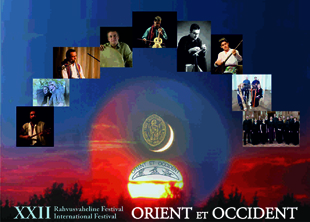Festival 2017
Dear Festival guests,
It is autumn again and our Festival ORIENT et OCCIDENT is about to reach you once again. Another meeting of the East and the West, traditional and classical music from the Orient and the Occident, masters of music from nearby and afar is about to take place...
Ever since its inception, the Festival’s main focus has been on juxtaposition and comparison of Eastern and Western musical cultures through the prism of history. The angle is extremely intriguing and inspiring and does not cease to offer joy of discovery, as the duration of these traditions can be counted back in hundreds and thousands of years. Despite the Asian musical cultures being, as a rule, living traditions and therefore undergoing continuous change while being passed on as an oral tradition, older and more recent layers can be differentiated even in these. Thus, the world famous player of the Persian string instruments tar and setar, Professor of the Tehran Academy of Music Mehran Mehrnia together with the Hamdam Ensemble will introduce to the audiences the more archaic layers of Persian music. At the same time it is fascinating to observe how completely contemporary-sounding compositions can be placed on the basis of classical music that follows strict rules. This is demonstrated by the virtuoso player of the Arab lute, the ud, Ahmad al Khatib from Palestine. For the first time in the Festival’s history we are witnessing a musical meeting of the Arab and Persian cultures. Against this background, it is engrossing to be able to listen to the brilliant string instrumentalist and teacher at the Tashkent Conservatory Ilyos Arabov from Uzbekistan who performs traditional/classical music from Cental Asia that has been influenced both by Persian as well as Arab music. Thus starts a sketch of the route of the Silk Road, on the European side of which we can find the music performed by Giovannangelo de Gennaro, the recognized fiddle player and singer from Italy, as well as Fa Schola Ensemble from Estonia. A selection of both traditional and boundary-defying music is offered also at our night concerts. The Schola Gregoriana Tartuensis, led by Lilian Langsepp, will appear with a programme of strictly traditional Gregorian chant, while the KuuKuu ensemble performs both melodies from the more archaic layer of the Japanese shakuhachi tradition as well as improvisational investigations that reach Estonian folk music. If one had to sum up the Festival in a couple of keywords, these could be “classics and contemporaneity? and “musical meetings?, all of which merge in the musical journeys along the Silk Road.
Enjoy the experience of the Festival!
Raho Langsepp,
Artistic Director of the Festival




